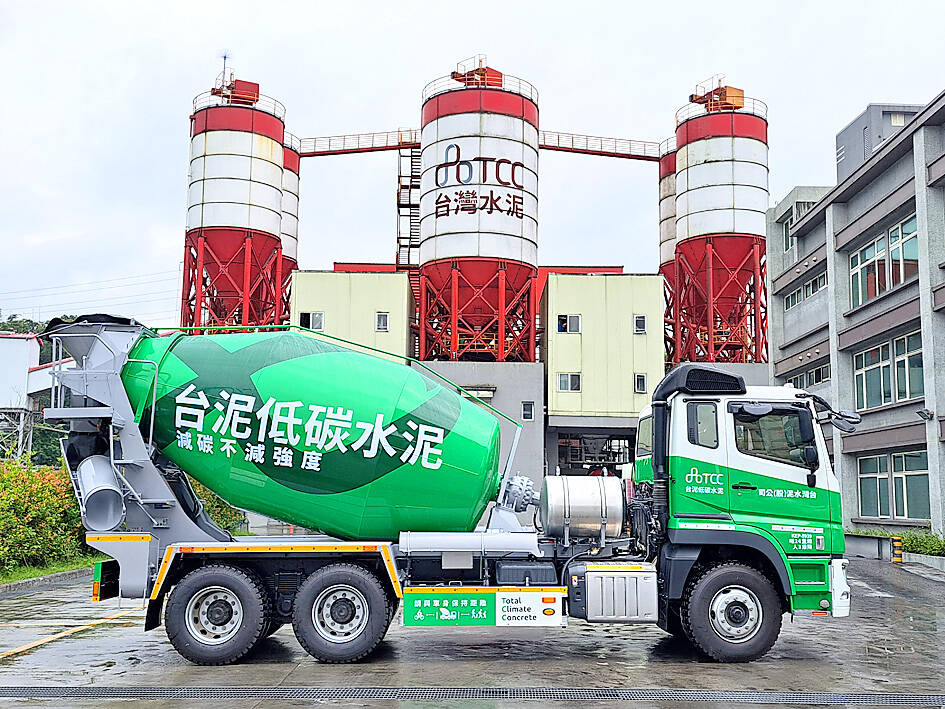Taiwan Cement Corp (台灣水泥), the nation’s biggest cement maker, yesterday reported that its net profit expanded 48 percent annually last year, thanks to contributions from its power-generation business in Taiwan and cement products with low carbon footprints sold in Europe.
Net profit grew to NT$7.99 billion (US$253.09 million), from NT$5.4 billion in 2022, the company said in a regulatory filing.
Earnings per share rose to NT$1.06, from NT$0.74 a year earlier.

Photo courtesy of Taiwan Cement Corp
While revenue last year fell 4.1 percent to NT$109.31 billion, from NT$113.93 billion, gross margin improved by 9.9 percentage points to 18.8 percent and operating margin rose 8.2 percentage points to 9.2 percent, reflecting the company’s efforts to enhance its profitability amid economic headwinds.
In the October-to-December quarter alone, the company’s net profit fell 27.6 percent year-on-year to NT$1.8 billion and revenue decreased 18.2 percent to NT$28.35 billion.
Taiwan Cement said in a statement that about 45 percent of its net profit last year came from low-carbon cement products sold in Europe.
As the cement market in China continues to slump with the supply and demand imbalance unlikely to reverse in the near-term, tapping into the low-carbon cement market in Europe from 2018 proved a necessary move to grow revenue and profit, as well as increase investment outside of China to diversify risk, the company said.
Taiwan Cement is the leading cement producer in Taiwan, Turkey and Portugal, and has a decent position in several southern and southwestern Chinese provinces.
It has a 38 percent market share in Taiwan and is the seventh-largest cement producer in China, company data showed.
In 2018, the company established a joint venture with Turkey’s OYAK Cimento AS and invested in Portuguese cement company Cimpor Portugal SGPS SA through that joint venture, Taiwan Cement said.
The joint venture’s net profit has grown six times in the past five years, and it is making a marked contribution to the parent company, it said.
Taiwan Cement said it is in talks with OYAK to acquire more of the highly profitable Turkey and Portugal cement operations — hoping to raise its stakes in the former from 40 percent to 60 percent and in the latter from 40 percent to 100 percent — as it aims to control the operations and further diversify its cement business globally.
If it closes the deals by the end of this quarter, as expected, the investments would not only create more income from its Turkey and Portugal operations, but also generate more free cash flow, which Fitch Ratings has said would more than compensate for the acquisition costs and help improve Taiwan cement’s leverage profile.
Taiwan Cement also generates stable cash flow from its coal-fired Ho-Ping Power Plant in Hualien County and has in the past few years expanded its green-transition businesses, including battery manufacturing in Kaohsiung, as well as energy storage and electric vehicle charging networks in Taiwan and abroad, which are conducive to its plans to ensure it has diversified and resilient operations in the long term, it said.

Meta Platforms Inc offered US$100 million bonuses to OpenAI employees in an unsuccessful bid to poach the ChatGPT maker’s talent and strengthen its own generative artificial intelligence (AI) teams, OpenAI CEO Sam Altman has said. Facebook’s parent company — a competitor of OpenAI — also offered “giant” annual salaries exceeding US$100 million to OpenAI staffers, Altman said in an interview on the Uncapped with Jack Altman podcast released on Tuesday. “It is crazy,” Sam Altman told his brother Jack in the interview. “I’m really happy that at least so far none of our best people have decided to take them

BYPASSING CHINA TARIFFS: In the first five months of this year, Foxconn sent US$4.4bn of iPhones to the US from India, compared with US$3.7bn in the whole of last year Nearly all the iPhones exported by Foxconn Technology Group (富士康科技集團) from India went to the US between March and last month, customs data showed, far above last year’s average of 50 percent and a clear sign of Apple Inc’s efforts to bypass high US tariffs imposed on China. The numbers, being reported by Reuters for the first time, show that Apple has realigned its India exports to almost exclusively serve the US market, when previously the devices were more widely distributed to nations including the Netherlands and the Czech Republic. During March to last month, Foxconn, known as Hon Hai Precision Industry

PLANS: MSI is also planning to upgrade its service center in the Netherlands Micro-Star International Co (MSI, 微星) yesterday said it plans to set up a server assembly line at its Poland service center this year at the earliest. The computer and peripherals manufacturer expects that the new server assembly line would shorten transportation times in shipments to European countries, a company spokesperson told the Taipei Times by telephone. MSI manufactures motherboards, graphics cards, notebook computers, servers, optical storage devices and communication devices. The company operates plants in Taiwan and China, and runs a global network of service centers. The company is also considering upgrading its service center in the Netherlands into a

Taiwan’s property market is entering a freeze, with mortgage activity across the nation’s six largest cities plummeting in the first quarter, H&B Realty Co (住商不動產) said yesterday, citing mounting pressure on housing demand amid tighter lending rules and regulatory curbs. Mortgage applications in Taipei, New Taipei City, Taoyuan, Taichung, Tainan and Kaohsiung totaled 28,078 from January to March, a sharp 36.3 percent decline from 44,082 in the same period last year, the nation’s largest real-estate brokerage by franchise said, citing data from the Joint Credit Information Center (JCIC, 聯徵中心). “The simultaneous decline across all six cities reflects just how drastically the market